#shiori
Text
rgu set a really weird bar for so-called “toxicity” because i don’t even think that juri and shiori are all that “toxic” at this point. they’re literally just normal teenage dykes who pulled swords out of each other
16 notes
·
View notes
Text
No gyatt for Nerizzler
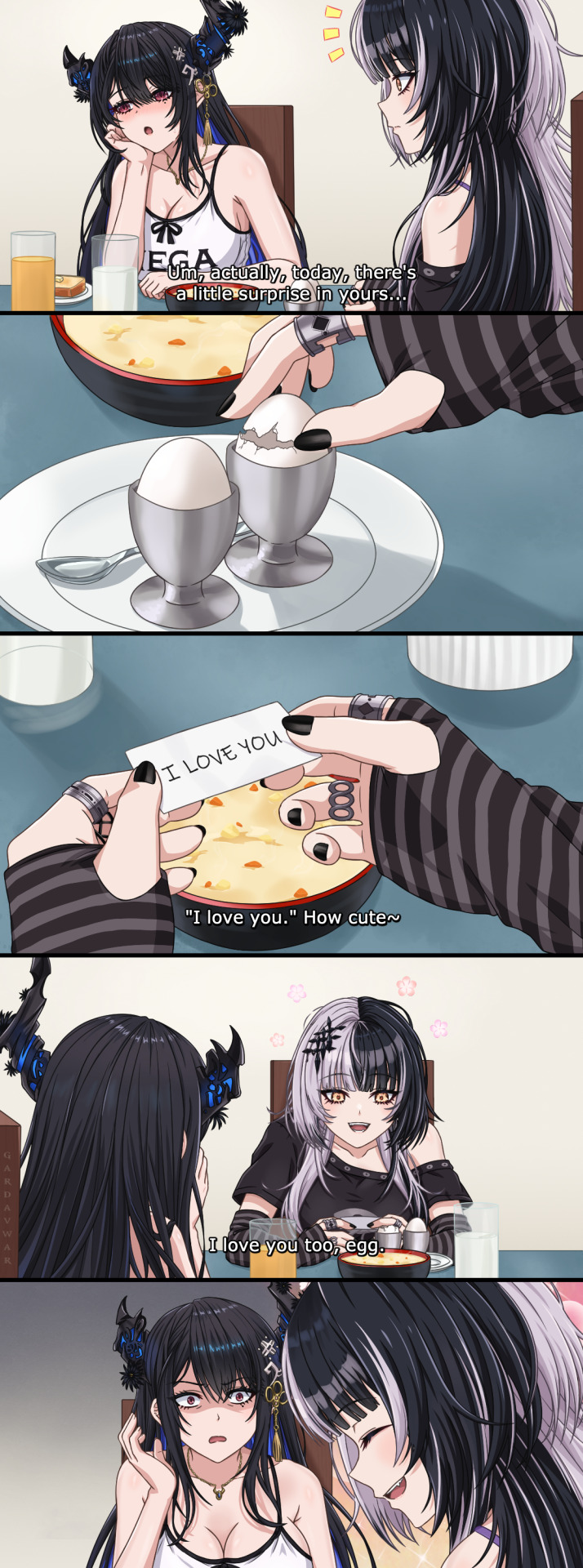
#hololive#vtuber#shioraven#shiori novella#nerissa ravencroft#shiorin#rissa#hololive advent#hololive english#shiori
1K notes
·
View notes
Text
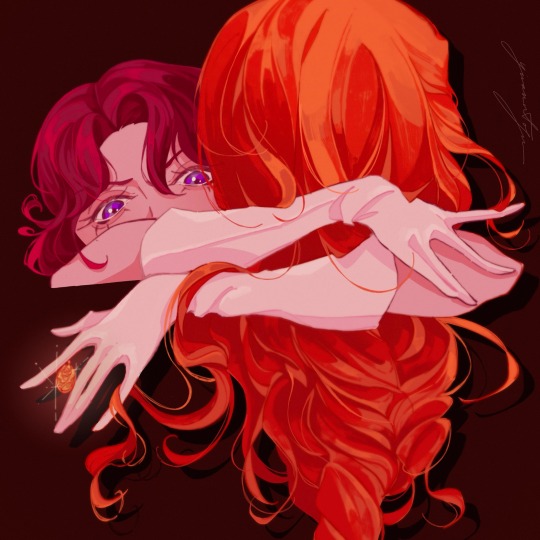
“the loser in love is the one who lets their heart be ruled by it”
#art#digitalart#myart#illustration#digital illustration#shiori#shiori takatsuki#arisugawa juri#juri#rgu#revolutionary girl utena#shoujo kakumei utena#toxic yuri#yuri#utena fanart
793 notes
·
View notes
Text
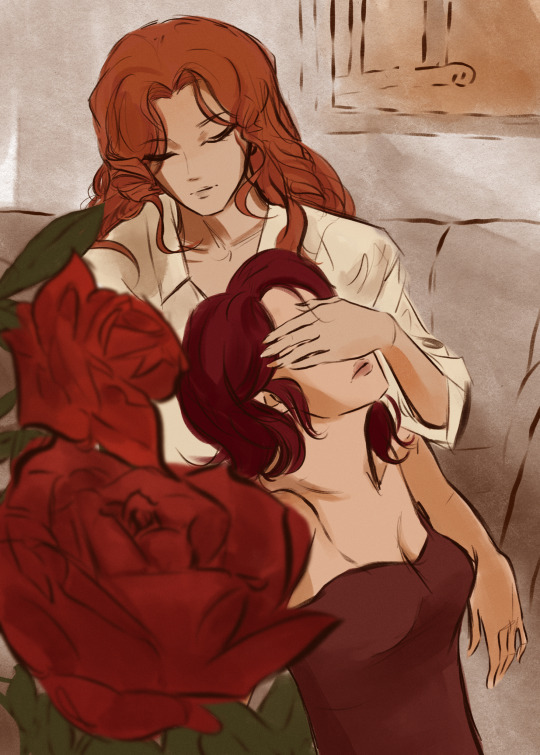
you don't know what you want, but you know that you're needing it bad
#happy birthday shiori#the girlfailure#juri arisugawa#shiori takatsuki#juriori#revolutionary girl utena#shoujo kakumei utena#rgu#utena#juri#shiori#lesbian#wlw art#my art
616 notes
·
View notes
Text


many discussions of toxic yuri and juriori on twitter these days and so i wanted to draw them..... yuri nation rise up
#utena#revolutionary girl utena#juri arisugawa#shiori takatsuki#juriori#yuri lol#toxic yuri#rgu#whats wrong with them#juri#shiori#art#fanart#utena fanart#screenshot redraw
1K notes
·
View notes
Text
Bird Symbolism in Revolutionary Girl Utena
There is quite a large amount of bird and bird-related imagery, symbolism, allegories and metaphors in Revolutionary Girl Utena, and i think all of them are very interesting. Here is a ~2000 word essay about the topic.
The Birdcage Garden: Anthy and Ohtori Academy
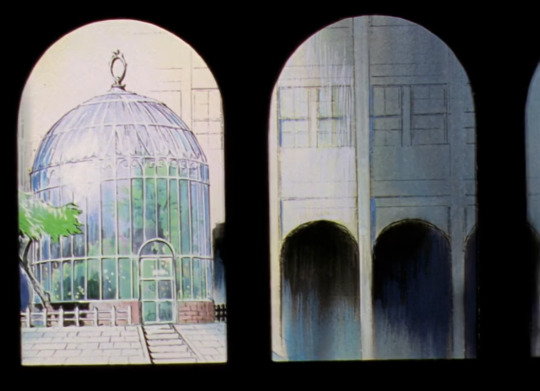
This is perhaps the most obvious of the bird symbols in Utena. It is literally Anthy's cage. It is where she, as the Rose Bride, is supposed to spend her time watering the flowers. Touga talks about never letting her out of it once he wins her, and calls her a "lovely little bird." And doesn't that just sum up what so many people's idealized version of her is like? A pretty thing to be admired, only in captivity.
I think the birdcage can also be seen as a sort of microcosm of Ohtori Academy as a whole. Akio does call the school "a garden where people will never become adults," after all, and Anthy is not the only person trapped there, nor is she the only character associated with birds.
According to this analysis, "Ohtori" as a word can mean "big bird" in japanese, and is also a Japanese term for the Fenghuang bird in Chinese mythology, said to be "beautiful, immortal and rules over all birds." Sounds a lot like a certain someone in charge of this place, doesn't it? Which would make every person in Ohtori a bird, symbolically speaking, trapped in the cage that is the academy and ruled by Akio (who, despite being the biggest, and the one with the most control, is also a caged bird.)
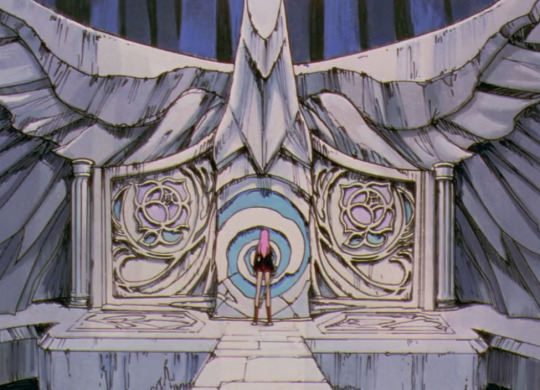
Additionally, the statue on the gate to the dueling arena is in the shape of a bird, before it transforms into a rose when opened. I am not sure exactly what this means, but I assume it is in some way symbolic of Akio, Anthy and Ohtori.
The Bird and the Window: Shiori and Juri
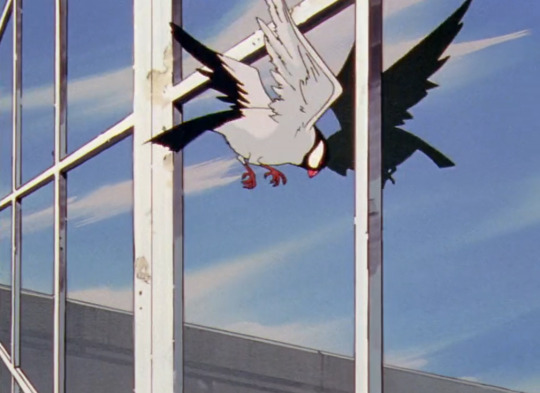
The bird that flies into the window during Shiori and Juri's conversation in episode 17 is a Java Sparrow. Despite its name, it is a part of the Estrildid Finch family, but I think the symbolism for sparrows fits the context more, as they can represent love, devotion and compainionship, all of which are very relevant for Juri and Shiori.
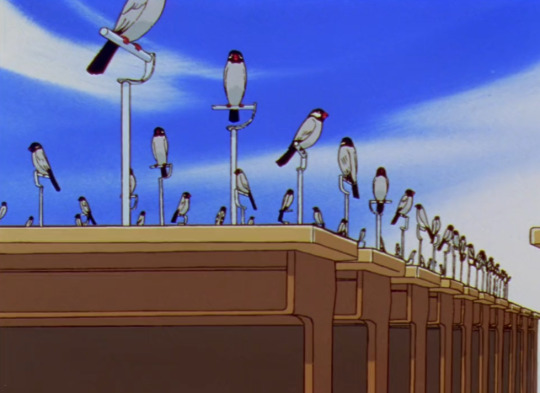
The bird is also the symbolic item for Shiori's black rose duel, which means we should associate the bird mainly with her. What, exactly, is the window, then? I think it is symbolic of Shiori's feelings for Juri, Juri's feelings for Shiori, or most likely both. The bird hits the window directly after Juri says "Is that all you have to say to me?" and turns to leave. The bird hits something it could not see in its flight, just as Shiori hits against something that hurts her, even if she doesn't understand it, in her conversation with Juri. The bird is shown to be lying still, presumably dead, after Juri reveals that she was never in love with the boy Shiori "stole" from her.
The bird is shown again after Juri throws her locket in the lake, and before Shiori finds it in her dorm. I've heard it discussed that this implies the bird retrieved the locket (probably through Anthy-as-Mamiya), and if the bird is symbolic of Shiori and the locket is symbolic of Juri's feelings for her, it would mean Shiori is the one to bring them back after Juri tries to rid herself of them. This makes sense.
The Bird Nest: Kozue and Miki
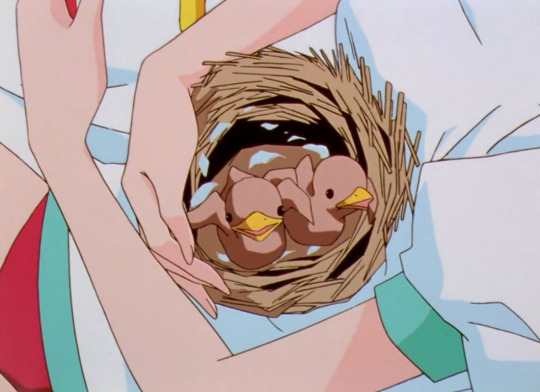
The bird nest that Kozue rescues from the tree that is going to be cut down is symbolic of her and Miki. Or, at least they are symbolic of how Kozue views the two of them. The comparison is pretty straightforward; Kozue projects her and Miki's feelings of abandonment onto these baby chicks, who have been left behind by their parents, just like the two of them were when their parents divorced. I think she projects her protectiveness over her brother moreso than her own feelings about the whole thing, as Kozue likes to think of herself as very independent ("a wild animal") and very unaffected by it all. As seen by her attempt to save the birds in the first place, she is very willing to put herself at risk, and is less concerned with her own feelings/safety.
Now, I don't want to get too much into speculation, but I have to wonder if there was more going on in the Kaoru family than just the divorce and the too-high expectations for the "twin prodigies." Miki's uncharacteristic cynicism in saying "adults who tell you something is for your own good can never be trusted," as well as Kozue's total disregard for authority and her tendency to use her sexuality as a tool both concern me. Although Miki and Kozue's parents are not explicitly shown to be abusive, I do not think it is a stretch to say that there is a possibility that they were. It explains some of Kozue's behaviour in regards to Miki as well. It's not just posesiveness but protectiveness. She has needed to protect him before, and she feels she needs to protect him still (pushing the predatory teacher down the stairs, saving the birds she sees his innocence in.)
Interestingly enough, Anthy interacts with these chicks as well. She advices Miki on how to feed and take care of them. Utena even comments on how unusually straight forward she's being about the whole thing. This might just be another instance of characterizing Anthy as a person who is fond of animals, and that is certainly part of it, but i think there is more to it as well. If these baby birds are symbolic of (Miki and Kozue's, but also a general) feeling of abandonment by parents/adults, as well as their potential abuse, what does that mean for Anthy not only knowing how to take care of them, but being eager to talk about it? Could it perhaps be that she, like Kozue, sees herself in them? Like Kozue, Anthy herself is symbolically a bird, but a caged one in contrast to Kozue's claims of being a wild animal. Could it be that Anthy has had to become an expert in taking care of those (herself) that have been abandoned or failed or abused by the adults in their lives? Rememeber that this is the same episode where she says that Akio is more like a father to her than a brother. A parallel is indirectly being drawn between him and the Kaoru parents.
If Miki and Kozue's parents were abusive, this might be a rare moment of Anthy empathising with other victims, telling them through metaphor how to take care of themselves. Although, it doesn't keep her from continuing to manipulate them, as she goes on to say her line about returning the chicks to their mother, which is what sets Kozue off. Anthy also says that she's never actually raised chicks before. Maybe she's not very good at taking care of them (herself) after all.
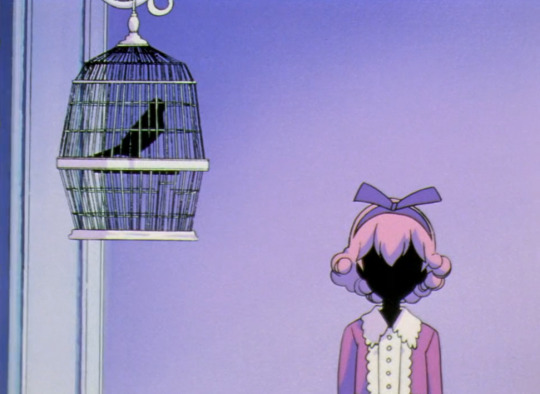
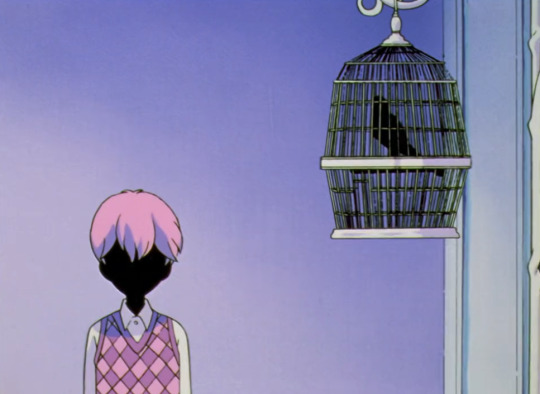
There's also what looks like two caged parakeets in Miki's flashback of their childhood. I assume this has similar meaning to Anthy's birdcage, as a feeling of being trapped, in this case by their parents' expectations for them. Kozue used to be a caged bird, but now claims to be a wild one, despite still being inside the birdcage that is Ohtori.
Brood Parasitism: Nanami and Touga (and Utena)
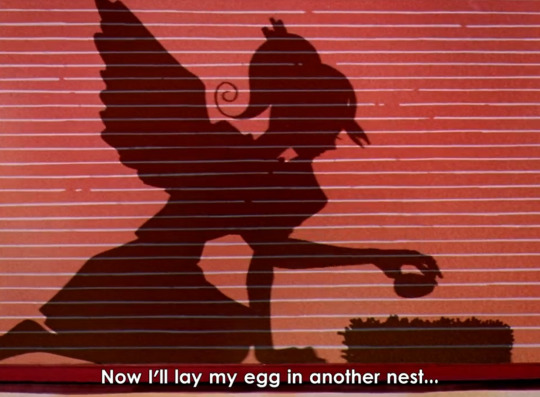
The Kaoru's are not the only sibling pair in Utena to be compared to birds. In Episode 31, Her Tragedy, a pretty unique shadow play is put on in the Chairman's Tower about a cuckoo leaving its egg in another bird's nest, a phenomenon known as brood parasitism. It also references the fairy tale The Ugly Duckling by Hans Christian Andersen. Perhaps the most interesting part of this play is that it's done in the style of the ones in the black rose arc, with C-Ko playing all the roles, the return of the monkey-catching robot, and Utena's fourth-wall breaking commentary at the end. I won't get into what this means, as it doesn't have anything to do with the bird metaphor, but maybe in another post.
This shadow play is about how Nanami and Touga were adopted, and specifically about Nanami's feelings on the matter. Of course adopted children are not parasites, but it makes sense for Nanami to think along those lines, considering her fear of being compared to animals or aliens, and of being ostracized by the society she lives in. Nanami doesn't actually know that she is adopted, only that Touga is, which muddies that interpretation a little. Perhaps it is about Nanami blaming Touga's birth parents for "leaving him in another nest"? Something about her resentment of Touga at this point in time, thinking of him as a parasite in their family? Or simply her fear of what not being his blood-relative means.
I'm more confident about the Ugly Duckling reference, and it being symbolic of Nanami's worry of not fitting in among her peers. Nanami mainly copes with this by thinking that the reason she doesn't fit in, is because she is actually better than everybody else, because she's related to Touga (being a beautiful swan among the common ducks.) The play ends with the cuckoo insisting that it will become a swan one day, when really it can't. It will never be a duck that fits in, either. It will always just be what it is, a parasite (a space-alien. A girl who lays eggs.) This reflects Nanami's despair at the idea that she's "just another fly in the swarm" after her duel in the next episode.
And like all the shadow plays this one can be interpreted as being about Utena as well. She is an orphan who is now being raised in Akio and Anthy's "nest". Although she wasn't placed there by anyone but Akio himself, so it's more about her insecurities about feeling like an outsider in their family. And like the Ugly Duckling/cuckoo, she is also out of place among the rest of the students, and dreams of growing up to be something she can't actually become, in this case a prince. (credits to this analysis on the shadow plays for helping me piece together my thoughts on that. Always cite your sources!)
Cuckoos can also be symbolic of one-sided love, and is the origin of the word cuckoldry. Make of that what you will.
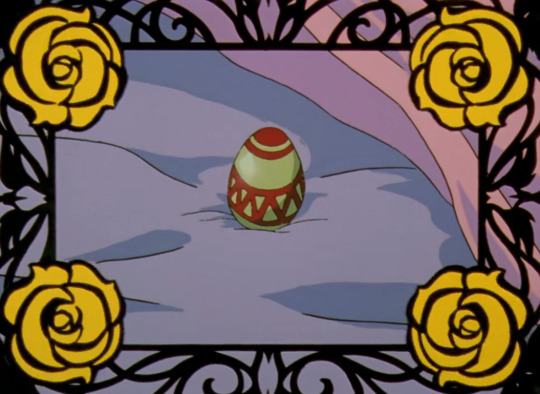
I should mention that Nanami also lays an egg of her own a few episodes prior. ...Or does she?
Her nightmare sequences show her fears of being compared to a chicken, a turtle, a frog, and of course, a space alien, but it is quite obviously a bird egg. And since we are later shown that Anthy has a chicken named Nanami, much like the cow with the same name, it can be assumed that the egg comes from there, and that Anthy brought it to Nanami's bed, perhaps via Chu-Chu. Could this relate to the brood parasitism of the cuckoo in some way? Is this not one bird (Anthy) laying its egg in another bird's (Nanami's) nest (bed) and getting them to raise it? is this what Anthy means when she tells Miki she has never personally raised chicks? Are all of these metaphors connected??? There's also the fan-theory that Nanami's egg hatched a reincarnated Chu-Chu, and in that case would he be the baby cuckoo while Anthy is the mother and Nanami is the duck? I'll be honest I'm not really sure what to make of it at this point. Draw whatever conclusion you want!
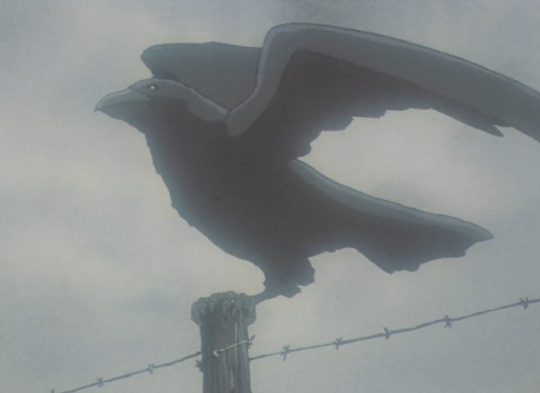
Last and probably least interesting is the third of Nanami associated bird imagery: the crow in episode 10. Crows can be symbolic of death, and it feels safe to say that this one is just here to set the mood of the scene, and as visual confirmation that the kitten did indeed die. Not too much to say there.
The Chicken and the Egg: The Student Council
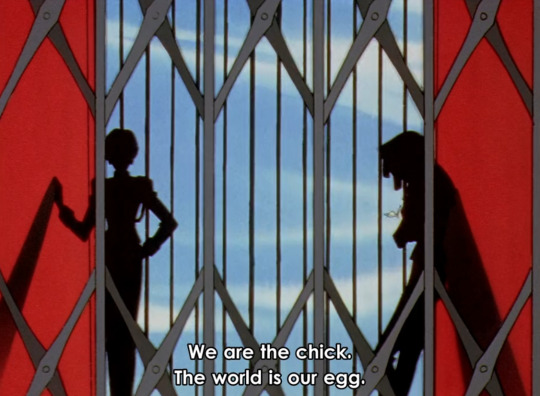
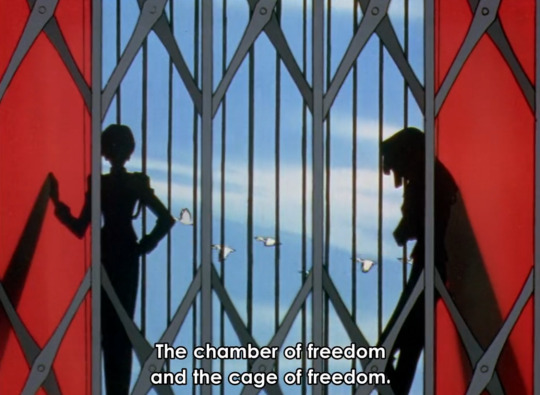
I'd be remiss if i didn't mention the student council's chicken and egg speech in this post as well, even if it has been analyzed to hell and back by hundreds of people before me. It is a reference to Hermann Hesse's book Demian. It is about breaking out of childhood and into adulthood. It is about escaping Ohtori, which is both the egg and the cage (and interestingly enough, during the speech birds can be seen flying by outside the cage of the elevator.) In Nanami's version of the egg speech she mentions "the cage of freedom" and how it cares for the chick. This something that ideally should be true for schools. A place that limits children, but in a way that prepares them for the adult world. Of course, Ohtori as a system has no interest in this, as it is a cage in its most literal sense: a place to keep people trapped. Trapped in their harmful behaviours, in their lack of growth, in their idealized memories of the past, and most of all, in childhood.
And with that, we have come full circle back to Anthy's birdcage as a symbol for all of Ohtori. Thanks for reading :)
#it's done! my first proper analysis-essay since my very first post on this account!!#i know it's long but i put a lot of work into this and i'd really appreciate if you read it ^_^#although i'm not entirely satisfied with the juri/shiori segment. if anyone has anything to add i'd love that#revolutionary girl utena#analysis#anthy#akio#shiori#juri#kozue#miki#nanami#touga#utena#m#animal motif#kaoru siblings#kiryuu siblings
283 notes
·
View notes
Photo

Kinbaku & Photo Tenma Haru
Model Shiori
1K notes
·
View notes
Text

5 pm
#revolutionary girl utena#rgu#shoujo kakumei utena#sku#arisugawa juri#juri arisugawa#juri#takatsuki shiori#shiori takatsuki#shiori#juriori#juri x shiori#shiori x juri#i thought juri would look cool playing the guitar#and then i thouhgt oh shiori would think juri would look cool playing the guitar#so uuuuuuuh yeah. lesbians
502 notes
·
View notes
Text

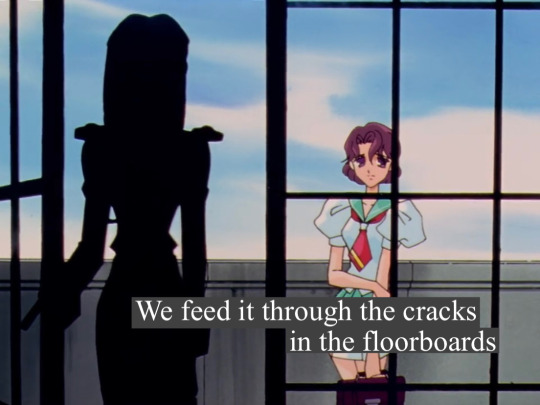

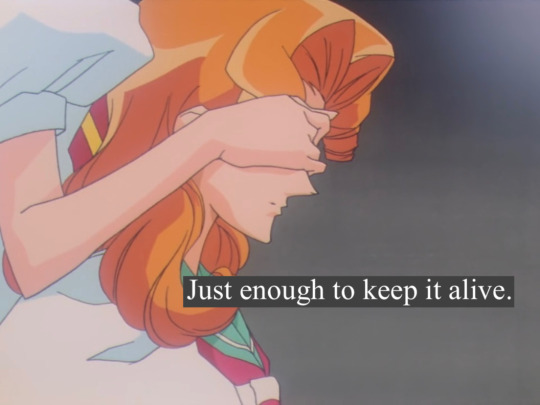


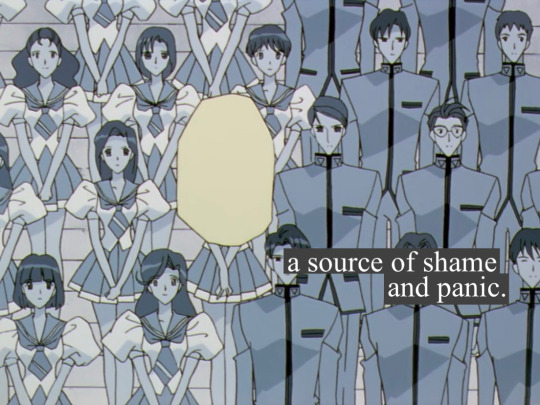
This is a horrible allegory for… whatever is on the other end.
Alt text: Screencaps from Revolutionary Girl Utena with overlaid text. 1: Juri stares at her open locket. Text: We keep it buried like a horrible secret.
2: Juri's silhouette stands in a doorway with her back to Shiori, who looks at her pleadingly. Text: We feed it through the cracks in the floorboards,
3: Juri's memory of Shiori, portrayed as a faceless shadow, stands in the fencing practice room holding a rose. Text: out of a sickening sense of nostalgia.
4: A shot of Juri as a middle schooler, with her eyes covered by Shiori's hands. Text: Just enough to keep it alive.
5: A closeup of Shiori's eyes widening in horror. Text: And yet it still comes to us in moments of weakness,
6: A silhouette of a sword emerging painfully from Juri's chest. Text: unbidden,
7: closeup of Juri's framed class photo, showing the empty space where Juri cut Shiori's face out to fit in her locket. Text: a source of shame and panic. End alt text
#revolutionary girl utena#disco elysium#shoujo kakumei utena#juri#shiori#this quote is. it’s so. yeah.
364 notes
·
View notes
Photo


let’s repost utena art from earlier this year
1K notes
·
View notes
Text

📀📀Boing Beauties🇯🇵
40 notes
·
View notes
Text
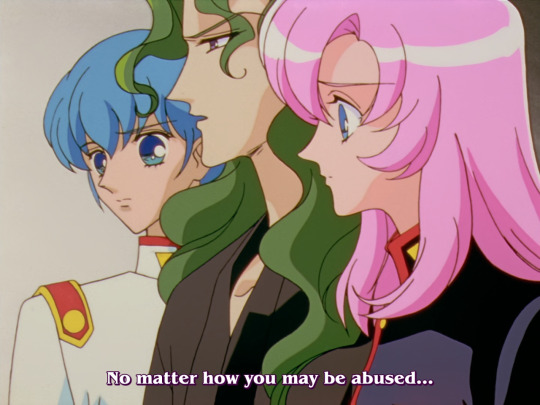


yet another moment where saionji says something incredibly trenchant and insightful only to be completely dismissed due to the ridiculous framing and the general cringiness that pervades everything he says and does (eg, pointing out that the castle is a trick of the light, announcing that they must shed the coffins end of the world has prepared for them, etc etc). obviously in this instance, he is both saying something that is proven correct throughout the show via a myriad of dynamics, but is also shown to be a precept that is teleologically challenged and rejected by anthy’s final choice.
upon a first viewing, one might assume saionji himself is talking about anthy here, whether by presumptuously assuming that she loves him despite his abuse, or claiming that her rejection of him does not lessen his love for her. either way, he seems totally delusional and moronic. i can only assume that utena, who has even less information than we do regarding saionji’s true feelings, assumes that he is talking about anthy, and thus dismisses him out of hand for being a violent idiot. and rightfully so. but also, he’s clearly not talking about anthy, even if he may think he is (or at least would claim that he was if questioned). and this statement is truly definitional to his relationship to touga, whom he resents, envies, and maybe even loathes, but whom he cannot seem to ever actually abandon.
even when he’s given the chance to start fresh, he returns to ohtori (and in this case you can say that it’s because he has nowhere to go, no family, the outside world is scary, ohtori is all he knows, he felt he had no other choice… but this was also true of anthy, and she eventually found the courage to leave! it’s very very hard, but it’s not impossible, which is the point). even as he vocally condemns akio’s system, he nonetheless participates in it, albeit reluctantly, for touga. he is freer, healthier, and kinder in wakaba’s dorm, but he is also deeply unhappy. which isn’t to say that he ever seems happy (at least, not after losing the rose bride), but his unhappiness in “wakaba flourishing” is that of depression, whereas his unhappiness around touga is that of resentment. he’s rightfully angry over constantly being mistreated, but at least he’s not lost. he has a purpose. even if it’s just the purpose of receiving abuse and putting up a futile fight, it’s a role he can play with the only person who has ever truly mattered to him. it’s all he knows; it’s the closest thing he has to real love. and so he stays.
nanami is in a very similar situation as saionji is. they both idealize a version of touga who never really existed, and cling to him despite his blatant mistreatment of them because he is the only person who has ever shown them true affection in their entire lives. he manipulates them, makes a laughingstock of them, facilitates and participates in sexually abusing them, but also makes sure that they are too dependent on him to leave them. nanami is even more blatant in illustrating this idea than saionji is, as for most of the show, she does not even resist against touga like saionji does, rather she purely venerates and worships him, to the point of parody. he is a terrible brother to her, but in such a way that makes it seem like he’s actually a good brother to an obnoxious, ridiculous sister. he is actively grooming her, and she has nowhere to run, because he has fashioned himself her entire world. she cannot fathom a world beyond his limits, her very own personal end of the world.
it’s somewhat unclear whether touga thinks that controlling saionji and nanami is necessary to keeping them around, or whether he only wants them around because he enjoys assuming control over others. it’s probably a mix of both. he probably does hold some affection for them, but cannot conceive of a way to keep them as close to him as he would like without exploiting them, because he believes that true friendship is for fools and true love is impossible. to touga, if every relationship must be imbalanced in some way, then he at least wants to be the one with the power in his deepest relationships, unaware (or at least, willfully ignorant) of the fact that by corrupting and perverting their dynamics, he is slowly tainting their naive childhood love and affection that drew them to him in the first place. so in touga’s case, he inverts saionji’s logic to refigure it as “love can only be facilitated through abuse, no one will truly show you love unless they have to (through exploitation).” it’s the logic of someone who sees the world through an almost 2D framework of abuse, exploitation, transaction, and control. it’s the logic of someone desperately sad and desperately cynical. nanami is very wise (and brave) to ultimately reject him/it, even though it, too, is all she knows.
tsuwabuki complicates the nanami/touga dynamic by aspiring to inhabit both their roles simultaneously, and so he allows himself to be subjected to nanami’s exploitation while simultaneously subjecting her to violence. he is happy to be abused by nanami not because he loves her per se, but because their abuse is mutual. shiori and juri have a similar dynamic, wherein they are both at fault in different ways, both attempt to avoid the other (physically and psychologically) and yet constantly collide like magnets. however, the i would argue that the abuse they face is largely systemic, and their behaviors are primarily a symptom of their internalized homophobia rather than overt malice (even though shiori may pretend otherwise). miki and kozue’s tension is also mutual. they both harm the other despite loving them deeply. because love is not a bandaid that revolves all pain, misunderstanding, and miscommunication. see: the utena and anthy ledge scene.
finally, i think this quote is actually most powerful when figuring it through the lens of utena, anthy, and akio. of course, akio has fostered a dependency in anthy much like touga has with nanami, and so she does not know how to leave him despite being in incredible pain at his hand. but she is not “happy,” as saionji puts it. she is the most miserable girl in the world. she doesn’t love akio as much as she loves the memory of him, the idea of dios (which is of course also true for nanami and saionji re: touga, arguably also true for juri re: shiori, miki re: kozue, etc etc) — but anthy needs akio. or at least, akio has convinced her that she does. he is end of the world, she cannot envision a life beyond his imposed limits.
but i actually find it more interesting with regards to utena and akio. i don’t think at any point in the show, utena ever actually has real, romantic feelings for akio. i think that she is terrified of him, and in her desperate feelings of trapped helplessness as he ensnares her, she convinces herself that those heart palpitations, startled movements, shocks and thrills she feels in her presence is the emotional response not of fear, but of affection. but we know that in anthy’s presence, she doesn’t feel afraid, she feels calm, relaxed, happy. being with anthy isn’t wildly exciting, constantly requiring rationalizations to explain away the dread and internal rejection she feels towards akio’s advances. being with anthy feels like coming home. and it’s why she is initially so happy to be accepted into anthy’s family, to have a big brother like akio, to live under their roof. in utena’s naive, hopeful mind, she is joining anthy’s family in the most innocent possible sense. and she endures it, the grooming, the abuse, the rape, the end of the world; she fights til her very last breath, because she is in love. no matter how [utena] may be abused (by akio), she’s always happy to be near the one she loves (anthy).
#remind me to write an analysis on the moniker ‘end of the world’ next#bc i only rly allude to that here#id in alt text#u#analysis#manalysis#saionji#utena#touga#anthy#akio#nanami#miki#kozue#juri#shiori#tsuwabuki#dios#utenanthy
407 notes
·
View notes
Text

Height gap
780 notes
·
View notes
Text
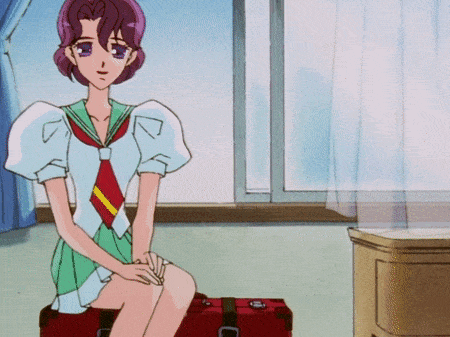
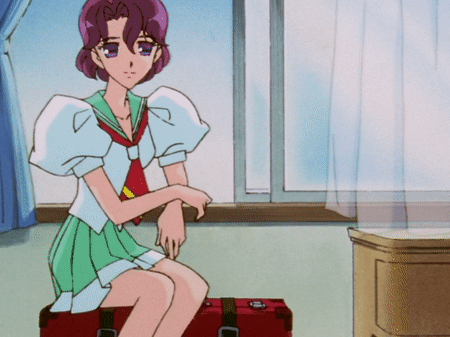

"Juri was always so wonderful... so strong, so imposing."
"Juri was my only friend... she was the only person I could ever depend on with all my heart."
#SHE WAS SO INSANE FOR THIS#utena#shiori takatsuki#juri arisugawa#juri#shiori#revolutionary girl utena
157 notes
·
View notes
Text
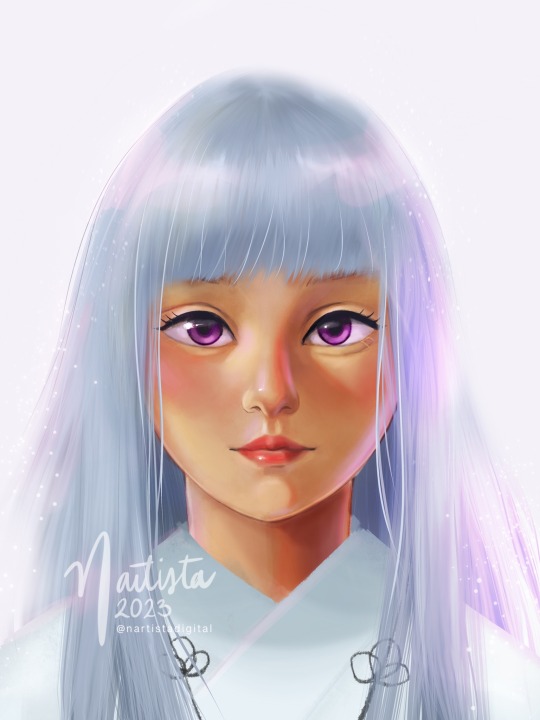
Shiori 💜 The last one for the Soft portrait series
Get early access on my patreon.com/nartista
#inuyasha#inuyasha fanart#illustration#digital art#artists on tumblr#nartista#shiori portrait#shiori#soft portrait series
56 notes
·
View notes
Text
it's interesting to me that shiori transferred out of ohtori but then came back, and that in the movie she becomes a car but crashes on her way to escape. it's like she gets so close to leaving but she falls short because she's doing it the wrong way, or not for the right reasons. she hasn't actually come to terms with anything, she's not actually trying to move on.
118 notes
·
View notes